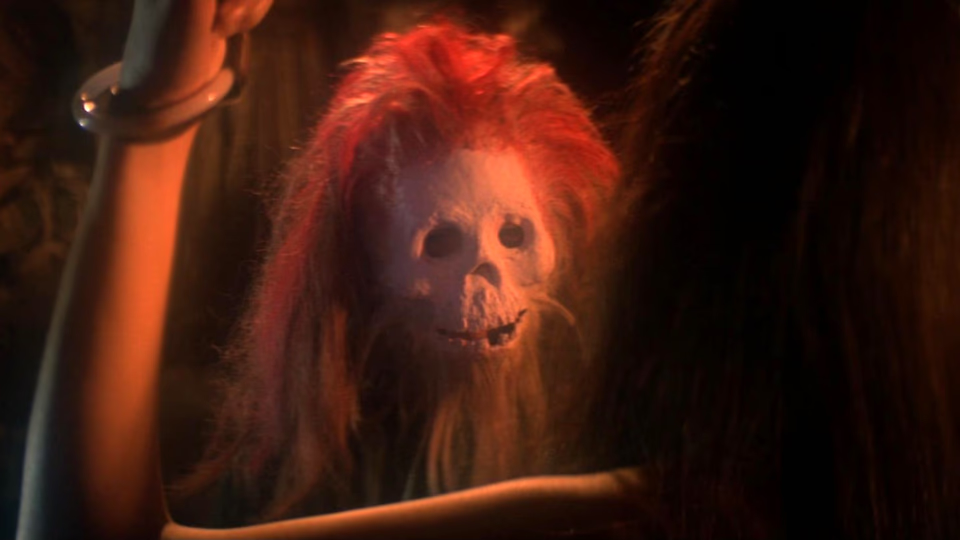Human Lanterns

Human Lanterns may not be a great martial arts movie or a great horror movie, but it proves an intriguing bridge for Shaw Brothers productions. A transitional piece between the straightforward kung-fu actioners like The Five Deadly Venoms that launched the studio to worldwide recognition, and the more overt horrors like The Boxer’s Omen that saw the studio trying to adjust to changing audience tastes.
The plot concerns two kung-fu masters, Lung Shu Ai, played by Tony Liu, and Tan Fu, played by Kuan Tai Chen. Both men lord over Phoenix town with their immense wealth and combat prowess. Desperate to one-up his rival, Lung Shu Ai determines to win the annual lantern festival and seeks out a reclusive artisan. Said artisan, named Chao Chun-Fang, turns out to be a man Lung Shu Ai defeated in a duel years prior. Still, Chun-Fang agrees to the commission and sets about crafting a macabre set of lanterns from unusual sources.
Based on the film’s title, you can guess where it’s going. There’s a near-Shakespearean quality of Chun-Fang’s machinations. He disappears victims, leading Lung Shu Ai and Tan Fu to suspect one another, and the local constable to suspect both men. When Chun-Fang stalks his prey, the film takes on slasher overtones, with Chun-Fang dressed in kind of a Michael Myers-meets-Bigfoot getup that would look ridiculous if not for Chun-Fang’s primate-style movements that render the whole disturbing.
After capturing his victims, Chun-Fang ties them up, strips them, tortures them and slices off their skin. These scenes are graphic by contemporary Shaw Brothers standards, featuring ample blood, but still tame compared to Western horror. In a sense they feel out of place, as they lend a graphic realism not present in the assorted kung-fu fights where combatants endure bone-crunching blows with little ill effect. Yet, the scenes prove necessary to frame Chun-Fang as the bigger monster.
Which is, perhaps, the film’s biggest flaw. All the characters are monsters. Lung Shu Ai and Tan Fu are egomaniacs bordering on tyrants. Chun-Fang is a sociopathic rapist and murderer. While Tony Liu and Kuan Tai Chen acquit themselves fine in their roles, neither performer packs enough inherent charisma to generate any sympathy or emotional investment. The characters themselves are underwritten and interchangeable. Further, the script eschews any sense of mystery. We spend much of the film waiting for the characters to piece together what we already know.
These aren’t fatal flaws, but they undermine what could have been a fantastic marriage of kung-fu and giallo. While contemporary Hong Kong releases like Ninja in the Dragon’s Den and Duel to the Death (released the following year) adjusted to changing audience tastes by upping the production values and violence, Human Lanterns seems reluctant to stray too far from the established Shaw Brothers formula. The familiar soundstages, bombastic dialog, and choreographed fight scenes are all present, with the horror elements sprinkled atop. The torture sequences seem spliced from another film, as Chun-Fang goes from trying to snare his prey in a giant sack—a kung-fu trope—in one scene, to peeling off their skin in another.
These horror sequences pack a lot of atmosphere, with stylized lighting, tight camerawork, and a dungeon-like set, but this mood proves limited to these scenes. The result is less a martial arts horror and more of a horror movie woven into a martial arts film. A genre mash-up but not a true hybrid.
More mystery and a charismatic audience surrogate would have helped, but as-is the film’s audience proves limited. It’s not a bad movie, just an average one, and Shaw Brothers has better offerings. Horror fans should consider The Boxer’s Omen. Kung-fu fans, The Five Deadly Venoms. But if you’ve exhausted the better films, and your taste Venn-Diagram overlaps between slasher-horror and kung-fu, you won’t feel burned. And for die-hard Shaw Brothers fans, Human Lanterns provides a fascinating look at a studio struggling to stay atop the exploitation genre as its core audience’s tastes changed.